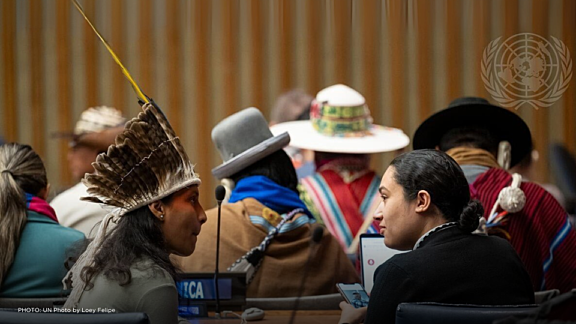
September 10, 2025
Virtual Intensive Trainings: Strengthening Indigenous Peoples’ Effective Participation at COP30
By Nancy Kelsey (Anishinaabe)
Global policy spaces like COP30, the United Nations climate conference happening in Brazil this November, may be difficult to navigate for first-timers. A six-part upcoming training series, co-organized by Nia Tero, seeks to demystify COP30 processes and make these forums more accessible to Indigenous Peoples who may have never participated before.
The two-hour intensive virtual trainings are focused on the following areas:
- Session one, Sept. 11: An Introduction to the United Nations Framework Convention on Climate Change (UNFCCC), Indigenous Caucus and more
- Session two, Sept. 18: Exploring climate finance
- Session three, Oct. 2: What is Article 6 and how does it affect Indigenous Peoples?
- Session four, Oct. 9: Discussion on the Loss & Damage fund
- Session five, Oct. 16: Spotlight on the Just Transition & Gender
- Session six, Oct. 30: Mitigation & Adaptation
The conveners of this series include the UN Voluntary Fund for Indigenous Peoples (UNVFIP), the Indigenous Peoples' Center for Documentation, Research and Information – Docip and the International Work Group for Indigenous Affairs (IWGIA). Sessions are offered in collaboration with the International Indigenous Peoples’ Forum on Climate Change and the International Indigenous Youth Forum on Climate Change, who are leading the discussions.
“Indigenous Peoples have been facing the direct consequences of climate change for decades and – since the beginning of this discussion, since the Rio Conventions were signed – have had something to say about climate change. Nobody can represent their own territories better than Indigenous Peoples,” says Carmen Guerra (Kankuamo, Colombia), Policy Manager for Nia Tero. “Now that we are moving forward to COP30, it’s 30 years of doing this. We need to recognize what Indigenous Peoples have been saying since the beginning: it is crucial to protect Mother Earth, guarantee legal recognition of their territories, and be involved in decision-making processes.”
Moving from observers to participants
The overarching goal of the sessions is to increase Indigenous Peoples’ capacity to effectively participate in COP30. This includes education about the UN spaces, mechanisms and processes, as well as ways Indigenous Peoples and their allies can engage with members states and other stakeholders.
“It’s important that Indigenous People know what the UNFCCC is and what our role is in all these negotiations and discussions because when people come for the first time, they think it’s easy and we can be at the negotiating table. And the reality is that we are only observers,” says UNFCCC Indigenous Peoples’ focal point Eileen Mairena Cunningham (Miskito, Nicaragua). “It’s important that Indigenous People be there but be there with knowledge around what the important thematic issues that we want to bring to the table. Also, how we get engaged with governments or states parties or other stakeholders in the process to raise our voices from the ground.”
She added, “The idea is to have an articulation between all the Indigenous People from the seven sociocultural regions and have a common agenda on the different thematic issues that we want [to discuss].”
A commitment to ongoing trainings & elevating Indigenous voices
For four years now, the UNVFIP, Docip and Nia Tero have held joint trainings as part of a larger curriculum, which explores all four of the UN mechanisms available specifically for Indigenous Peoples, as well as broader spaces like COP30.
Hundreds of Indigenous Peoples and allies from all over the world attend each session. More than 25 sessions will be held this year. They have demonstrated the power of harnessing Indigenous Peoples’ collective power to affect change and better represent their communities.
“We have different ways of thinking and ways we connect with the environment,” says UNVFIP Secretary Morse Caoagas Flores (Ibanag, Philippines.) “We might be very different. But , when we come all together in a space, like in our trainings, we realize that there's so many more commonalities.”
He added, “At the end of the day, everybody really just wants to have their land demarcated, delineated, or recognized or themselves recognized. And we realize that everybody wants to have access to drinkable water, and everybody wants to have the same recognition of their Indigenous language or access to education and employment. … So yes, there is diversity [of Indigenous Peoples] and I think we should recognize that. But that also gives us an opportunity to define common ground on the things that we do.”
How to attend the trainings
Sessions for this training series take place from 4-6 p.m. (Geneva), 9-11 a.m. (Colombia, Peru and Ecuador), 11 a.m. to noon (New York). Interpretation is available in English, Spanish, Portuguese, French and Russian. Participants will receive a link to the recording, along with relevant materials and presentations after each session.
For updates on future sessions, including how to register, follow Nia Tero’s social media: @NiaTero on Instagram and on Facebook or LinkedIn.